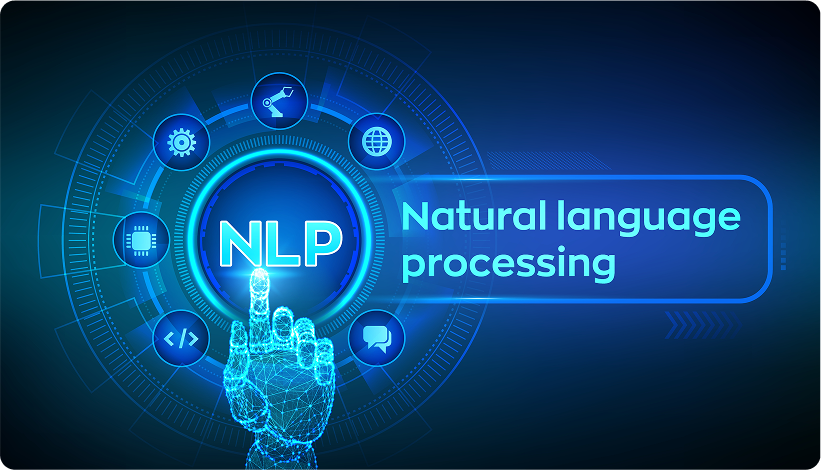
Have you ever asked Siri a question, chatted with a customer support bot, or used Chat GPT, Claude, or even Google Translate? If yes, then you’ve already experienced Natural Language Processing (NLP) in action, without even realizing it!
NLP is the technology that helps computers understand human language. It lets machines read, listen, talk, and even make sense of emotions in text, just like we do.
Today, businesses are swimming in words, emails, reviews, chats, social media posts, reports, and more. There’s so much information, but most of it is unstructured and hard to process. That’s where NLP becomes a game-changer.
From helping doctors quickly review patient notes to allowing banks to detect fraud, NLP applications are everywhere. And they’re not just helpful, they’re transforming how companies work, serve customers, and make smart decisions.
In this blog, we’ll walk you through what NLP can do, where it’s being used across industries, and why it’s one of the most powerful tools in the modern business world. Let’s dive in!
Why NLP Matters in the Modern Business Landscape
We live in a world flooded with unstructured text, emails, social media posts, reviews, reports, and documents. Businesses need a way to make sense of all this information. That’s where NLP comes in.
With the help of NLP, machines can understand and respond to human language, turning messy data into meaningful insights. Whether it’s automating customer support, analyzing patient records, or reviewing legal contracts, NLP is transforming how we work, interact, and make decisions.
Core Capabilities of NLP
So, what exactly can NLP do? A lot more than just understanding text. Think of it as giving computers the ability to read, listen, talk, and even “feel” human language. Here are the key skills that make NLP so powerful:
1. Text Classification
Imagine sorting through thousands of customer reviews and instantly knowing which ones are complaints, praises, or feature requests. That’s text classification. It helps businesses quickly organize and understand large volumes of text by tagging them into categories.
2. Named Entity Recognition (NER)
Ever noticed how Google highlights dates, names, or locations in emails and messages? That’s NER at work. It finds and labels important pieces of information like company names, phone numbers, places, and more.
3. Sentiment Analysis
Want to know if your customers are happy or frustrated, without reading every review? Sentiment analysis does just that. It detects emotions in text, helping businesses understand the tone behind the words.
4. Part-of-Speech Tagging
This is where NLP becomes a grammar nerd. It identifies whether a word is a noun, verb, adjective, etc. While it may sound technical, it helps systems better understand sentence structure and meaning, crucial for accurate responses and translations.
5. Tokenization & Lemmatization
These fancy terms simply mean breaking down sentences into individual words (tokens) and reducing words to their base form (lemma). For example, “running,” “ran,” and “runs” all become “run.” This helps machines understand context and avoid confusion.
6. Language Translation
We’ve all used Google Translate at some point, right? NLP powers real-time translation between languages, making global communication smoother, especially for international businesses.
7. Text Summarization
Faced with a 50-page report and only 5 minutes to read it? NLP can condense long documents into short, meaningful summaries, saving time while keeping the important stuff.
8. Conversational AI & Chatbots
From booking tickets to tracking orders, AI-powered chatbots can now handle it all. Thanks to NLP, they understand natural language, respond like humans, and keep getting smarter over time.
In short: These capabilities allow your AI-enabled system to do everything from answering customer queries to scanning legal documents and predicting market trends. It’s like giving superpowers to your business software!

Industry-Specific NLP Applications
Let’s dive into how NLP is being used across different industries to solve real-world problems.
Healthcare
Applications of NLP in healthcare are driving efficiency and better patient care.
- Clinical document processing: Doctors deal with massive paperwork, NLP helps extract information from clinical notes, lab reports, and discharge summaries.
- Automated medical coding: NLP can assign medical billing codes automatically based on diagnosis or treatment text, reducing manual errors.
- Analyzing patient feedback and doctor notes: Hospitals use NLP to find patterns in patient feedback, helping improve services and safety.
Interesting fact: IBM Watson Health used NLP to help oncologists interpret medical literature and recommend cancer treatments
Finance
NLP applications in finance help firms stay competitive, secure, and customer-friendly.
- Fraud detection: NLP detects unusual patterns in communication or documents, flagging potential fraud.
- Document automation: KYC forms, loan agreements, and investment contracts can be processed automatically.
- Financial sentiment analysis: Analysts use NLP to gauge market mood from news headlines or social media, aiding in trading decisions.
Example: Hedge funds analyze tweets and financial news using NLP to predict stock movements.
Legal
The legal industry thrives on precision and information, two things NLP can offer in spades.
- Contract analysis and review: NLP can scan contracts to highlight risks, unusual clauses, or obligations.
- Legal research automation: It quickly surfaces relevant case law or statutes, saving countless hours of manual research.
- Case law summarization: NLP creates short, readable versions of lengthy judgments or legal documents.
Insight: Law firms are using AI-based legal assistants to prep for trials faster and more accurately.
Retail & E-commerce
The applications of NLP in retail are helping brands understand customers better and offer smarter shopping experiences.
- Product categorization: NLP helps in tagging and organizing large product inventories.
- Customer service chatbots: Retailers use NLP-driven bots for 24/7 support, reducing call center loads.
- Voice commerce: Shoppers can now order items using voice commands, thanks to NLP.
Did you know? Amazon Alexa and Google Assistant use NLP to handle millions of customer queries daily.
Marketing
In marketing, NLP applications fuel smarter campaigns and personalized engagement.
- Sentiment and brand monitoring: Brands use NLP to monitor how people feel about them on Twitter, Reddit, and other platforms.
- Personalization: Based on customer language in chats or searches, brands customize product recommendations and messages.
- Competitor analysis: NLP scrapes competitor content to uncover their strategy and customer sentiment.
Example: Coca-Cola uses NLP to track social media trends and tweak their messaging in real-time.
HR & Recruitment
HR departments rely on NLP to speed up hiring and improve employee satisfaction.
- Resume parsing: NLP quickly reads resumes and matches them to job roles.
- Interview scheduling: Smart assistants can handle interview coordination and follow-ups.
- Employee sentiment tracking: NLP helps HR monitor internal surveys and feedback.
- Improving retention: By analyzing exit interviews and performance reviews, NLP can detect reasons for attrition early.
Fact: Some companies use AI hiring tools powered by NLP to reduce unconscious bias in shortlisting candidates.

Benefits of Adopting NLP in Business
Let’s recap why applications of NLP are game-changers for modern businesses:
- Turn unstructured text into valuable insights From documents to reviews, NLP helps you make sense of it all.
- Better customer experiences With chatbots, sentiment detection, and personalization, customers feel heard and understood.
- Automate the boring stuff NLP handles repetitive tasks like data entry, summarization, and form filling, freeing up human time.
- Make data-driven decisions Quickly process large volumes of content and use those insights to act faster and smarter.
How Can iTech Help You with NLP Solutions?
At iTech, we build powerful NLP solutions tailored to your business needs. Whether you need to automate document processing, build a smart chatbot, or analyze customer sentiment, we’ve got the tools and experience to make it happen.
We help businesses unlock the power of language through AI, making systems more intelligent, processes more efficient, and customers more satisfied.
Final Thoughts
From hospitals to courtrooms, from classrooms to e-commerce sites, NLP applications are reshaping how we interact with technology and information. As businesses deal with more data than ever, NLP provides a smarter way to work, communicate, and grow.
If you’re thinking about how to apply NLP in your business, whether it’s automating routine tasks or unlocking deeper insights from customer feedback, iTech is here to help. Let’s build intelligent solutions that truly speak your language.
Talk to us today to learn how our NLP expertise can transform your operations.
FAQs
1. What are the real-world applications of Natural Language Processing (NLP)?
Real-world NLP applications include chatbots, resume screening, sentiment analysis, legal research, and clinical document automation, among many others.
2. What industries are using NLP the most today?
Key industries include healthcare, finance, law, marketing, retail, and HR.
3. How is NLP used in automating customer support?
NLP powers chatbots that can understand customer queries, respond in real time, and even escalate complex issues.
4. In what ways does NLP enhance sentiment analysis for businesses?
NLP helps analyze customer reviews, tweets, and surveys to understand how people feel about a product or brand.
5. How does NLP improve search functionality in digital platforms?
NLP enhances search by understanding context, synonyms, and natural language queries instead of just matching keywords.
6. Can NLP be used to summarize large volumes of text automatically?
Yes! NLP-driven summarization tools are used in news, law, and research to extract key points from long documents.
7. How does NLP help in analyzing unstructured business data?
It turns unstructured text, emails, chats, reports, into organized insights for better decision-making.
8. What are the limitations or challenges of NLP in real applications?
Challenges include handling sarcasm, slang, domain-specific language, and understanding context across languages.
9. Is NLP accurate for multilingual or regional language processing?
While improving, accuracy still varies. But new models like multilingual BERT are closing the gap.
10. How is NLP integrated into AI chatbots and virtual assistants?
NLP allows chatbots to understand natural language, extract intent, respond contextually, and improve over time through learning.










